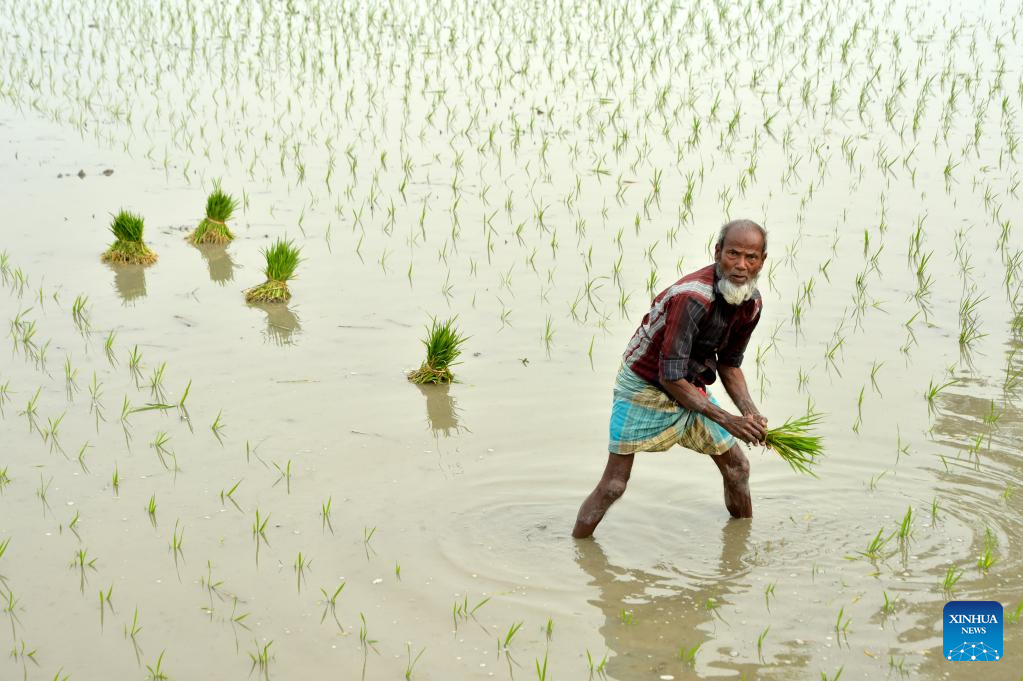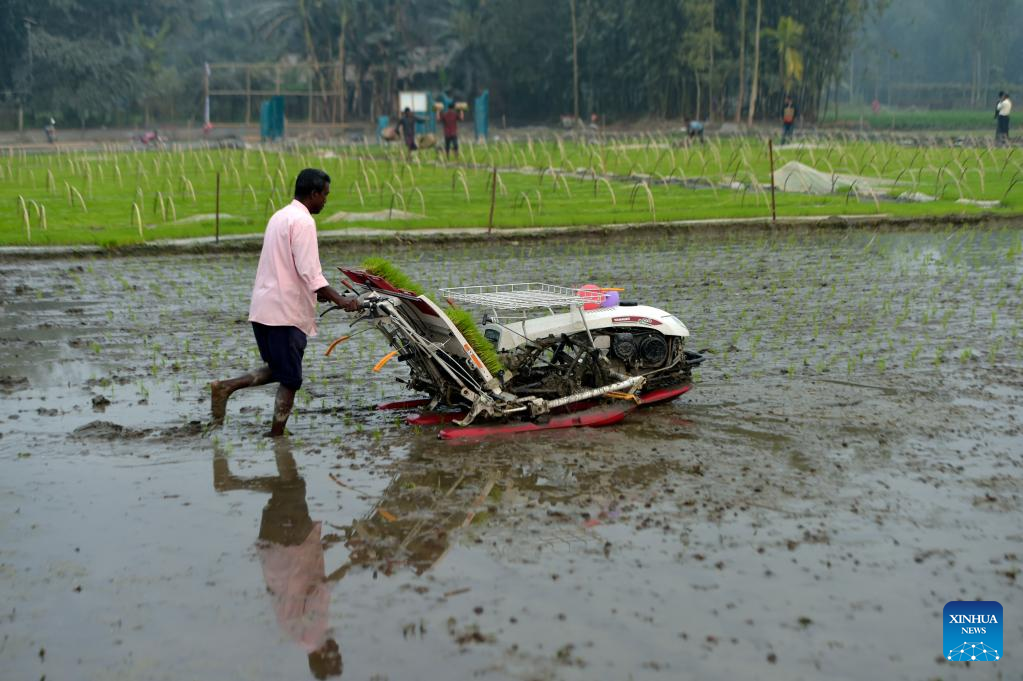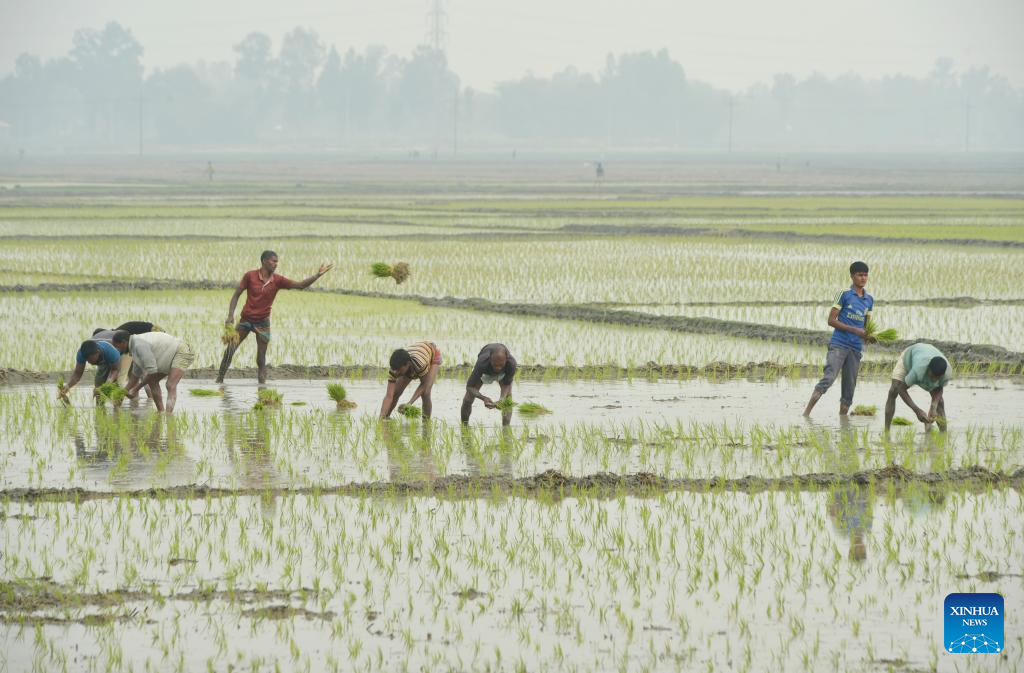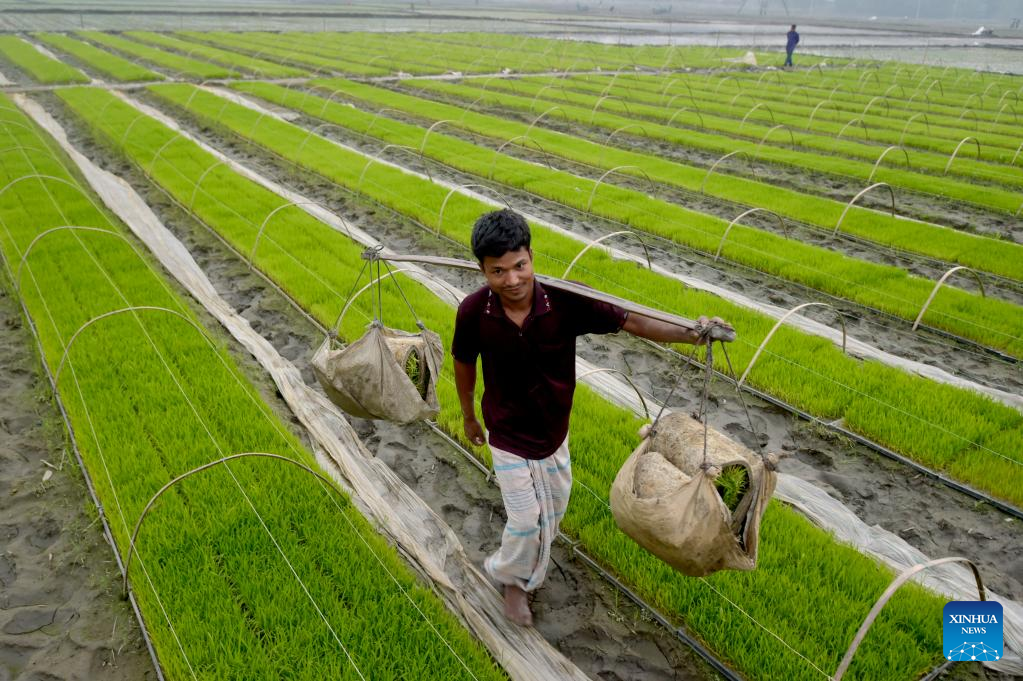Feature: Chinese seeds, machines boon for Bangladeshi farmers' rice output

A farmer plants rice seedlings in a field in Nilphamari, Bangladesh, Feb. 9, 2023. (Xinhua)
NILPHAMARI, Bangladesh, Feb. 24 (Xinhua) -- China's Chongqing Zhong Yi is a frequent participant in China's aid and technical collaborations and a leader in rice technology cooperation in Bangladesh.
The Chinese seed giant exports 2,600 tons of seeds of high-yielding Chinese rice varieties to Asia and Africa each year.
Of the total, around 1,500 tons go to Bangladesh where the "Janakraj" strain is the most popular with its high yield, high resistance to pests, and high quality.
Currently Bangladesh's Ministry of Agriculture and Chongqing Zhong Yi Seed distribute at least eight hybrid strains in parts of the South Asian country including Nilphamari district, some 360 km northwest of the Bangladeshi capital Dhaka.
Badal Islam, a farmer from Nilphamari district, has grown Chinese rice varieties with good yields. "We've benefited immensely from the good yields."
"This is why we're cultivating Chinese rice again and again," Islam told Xinhua, adding "Now I'm cultivating Chinese rice in 3 bigha (0.3306 acre) land, this rice looks good, the yield is good and I like to cultivate it."
Farmer Md Asir Uddin said Chinese seeds are vital to their ambition to become self-sufficient in rice production. "We get 24-25 maunds of paddy after harvesting from 1 bigha," he said. He added they grow "Chinese Rice 28" and they benefit from the higher yield.
"We cultivate this rice because this rice is not affected by any viruses or insects," he said. The farmer said they expect a bumper production and a lot of profit if the market is good from Boro, or winter rice cultivation season, when most Bangladeshis eat rice three times a day.
Boro is the predominant crop in the three main crop-growing seasons in Bangladesh. It is also the dry season irrigating rice crop planted from December to early February and harvested between April and June.
Sahirul Islam, a representative of the seed supplier National AgriCare Group, said farmers in northern Bangladesh are widely cultivating high-yielding rice varieties, especially seeds brought from China.
Among high-yielding rice varieties, he said "Janakraj, National AgriCare Dhan 4, National AgriCare Dhan 1 have been widely accepted by farmers. Farmers received good yields last time so this time they are using our seeds."
"If we calculate the (amount of) seeds that the farmers have taken from us, then about 90,000 to 95,000 acres of land is being cultivated in (northern) Rangpur region," he said.
He said so far the weather is fine and seedbeds are good for farmers. "We hope this year's cultivation will be very successful," said Islam. He believed the advantage is that people are planting seeds in trays, following this Chinese machinery is used by farmers to plant rice.
Farmers pick up rice seeds from seedbeds and plant them through China-made machines, he said. "With the advent of Chinese machinery, rice cultivation in our country has become very easy."
In parts of Bangladesh, farmers do not want to plant anything other than high-yielding Chinese rice varieties because Chinese agriculturists work directly with farmers in their fields.
The Chinese experts understand the needs of particular crop and have knowledge of current trends in rice cultivation that Bangladeshi farmers can only dream of.
Ling Jiahu of Chongqing Zhong Yi said they have a world-class research team, seen as the backbone of China's seed industry. According to Ling, yields of high-yielding Chinese rice varieties can reach 11 tons per hectare, 30 percent higher than local Bangladeshi varieties.
Abu Bakkar Siddique of Bangladesh's Department of Agricultural Extension previously told Xinhua that hybrid rice is a winter crop in just over half of the country's paddies and plays an important role in food production.
"AgriCare hybrid seeds from China sold here are very satisfactory," he said. "Chinese companies are crucial to our agricultural development and we're very grateful for their support."

A farmer uses a machine to plant rice seedlings in a field in Nilphamari, Bangladesh, Feb. 9, 2023. (Xinhua)

Farmers plant rice seedlings in a field in Nilphamari, Bangladesh, Feb. 9, 2023. (Xinhua)

A farmer transports rice seedlings in a field in Nilphamari, Bangladesh, Feb. 9, 2023. (Xinhua)

